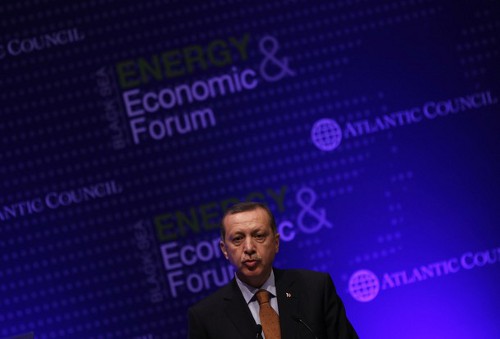
Afghanistan is both the key and the lock preventing the Central Asian region from moving further, said Ambassador Robert Finn as he opened yesterday’s “Key Regional Perspectives: Central Asia” session at the Black Sea Energy and Economic Forum. “We need to talk about Afghanistan when we talk about Central Asia,” he said.
A discussion of key Black Sea issues of stability, freedom, and prosperity—the focus of the Forum—would have been incomplete without discussing Afghanistan. Indeed, this country is crucial to the Central Asian region’s economic and political development.
Four panelists spoke during this session: Shaukat Aziz, former Pakistani prime minister; Sherali Gul, energy and industry minister of Tajikistan; Kairat Kelimbetov, Kazakhstan’s minister of economic development and trade; and Ashraf Ghani, chairman of the Afghan transition commission.
Though torn by decades of conflict and poverty, Afghanistan has amazing potential. Within its war-torn soil lie vast deposits of mineral reserves including iron, copper, and gold. In fact, Ghani pointed out that Afghanistan is poised to become the world’s largest copper producer in the near future.
Aziz discussed briefly how the Trans-Afghanistan pipeline idea (proposed by the Asian Development Bank), has the potential for creating greater regional linkages through “pipeline diplomacy” by bringing natural gas from Turkmenistan through Afghanistan into Pakistan and then to India. Trade, according to Aziz, is the best way to move forward economic integration and regional collaboration.
But without the political will, and a resolution to the security and a series of institutional challenges, this potential will not materialize. Several panelists, including Aziz, echoed this idea.
Discussion of these issues is crucial to trying to generate ideas for resolving them, and making sure Afghanistan does not fade into the background as the larger issues of the global financial crisis, the Arab awakening, or China’s rise.
Afghanistan and Pakistan are now, Ghani pointed out, close to three generations of conflict.
With US troops pulling out in 2014, the key question is whether or not the Afghan government will be able to provide security for the country, or whether internal conflict will break out once again. Without security in Afghanistan, it is difficult to envision the development of regional cooperation and trade.
“The region needs to make a choice,” said Ghani, “a stable Afghanistan…is absolutely essential.”
Ghanialso noted that a distinction must be made between stability and security. “Stability in Afghanistan cannot come from the barrel of a gun, but use of force is required because the nature of the threats that exist,” he said, adding that the nature of the threats from the border has increased, and that terror is being supported by some states in the region.
Aziz said that the withdrawal is a positive thing “so long as there is enough capacity in Afghanistan to protect [its] own security.”
Yet uncertainty ultimately remains about Afghanistan’s ability to do just that.
Anna Borshchevskaya is the Assistant Director of the Atlantic Council’s Patriciu Eurasia Center. Prior to joining the Atlantic Council in 2011, she served as a qualitative research analyst for Glevum Associates, a U.S. military contractor, conducting public opinion research in Afghanistan.
Image: erdogan_0.jpg
